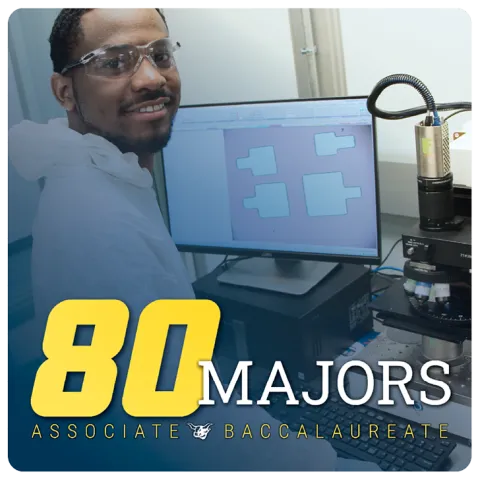Planning for your Future

Alfred State College knows the value of college preparation — we see it every day. Let us share some tips and tricks we’ve learned as higher education experts!
Your future is waiting!
Hit the ground running® ...
“Why should I go to college?”
To get a job
It might seem like a no-brainer. But did you know, almost all jobs require some education beyond high school? According to a recent study, over 60 percent of job openings require college education.
Now is the time to start taking those first all-important steps toward college success. In addition to enrolling in strong academic courses, studying, and working hard to earn the best grades possible, there are several things you can start now.
“To Do” List
1.CHOOSE A PATH
Each of us is unique—which is why there are so many career options out there. What do you like to do in your free time? Are you an introvert or an extrovert? Do you like math and science? Are you a budding artist? Choose a Career Path!
2.REACH OUT
Talk with family, friends, and people in your community about their jobs. Review websites that give specific information on careers. Shadow someone currently working in a field that sparks your interest.
Talk with your school counselor and start looking at college websites. Attend college fair programs where representatives from many colleges gather to talk to interested students. Don’t forget to get your name on those college mailing lists. You can do this from nearly any college website. Finally, attend a few college open house programs once you’ve narrowed down your list.
3.RESEARCH
You’ll need to know what type of educational and experiential background or training is needed (and what is preferred) to work in your chosen field. Check out job listings online or talk with professionals in your chosen field.
Consider the following during your college search: requirements for admission, available majors, costs, financial aid and scholarships, location, campus activities, athletics, campus housing, admission selectivity, and any other characteristics that are important to you, like rural vs. urban or available online course offerings.
4.GET INVOLVED
In all the rush to get ready for college, sometimes it’s easy to forget the importance of where you are right now. After school work, your first priority should be getting involved in school and community activities. Take advantage of your summer vacation—many colleges offer summer programs for high school students. You could also join a summer athletic team, develop and focus on a hobby, volunteer, or get a summer job when you’re old enough.
And look for leadership roles whenever possible—many schools take this into consideration when making admissions decisions. This is a great way to learn about various activities that might help you in choosing a career. And it’s a lot of fun!
Undecided?
If you’re undecided about your career goals, the undeclared major may be right for you! This program gives you the opportunity to try different options and select a course of study the first two semesters that fits your interests and background.

Academic Prep for College
What you’re doing now will affect everything you do later.
Beginning in 9th-grade, all courses, grades, and credits become part of your transcript (an official document detailing your academic achievement in high school). College admission decisions are largely based on the information on your transcript, so it’s important that you make the most of your time in school by taking challenging courses, earning the best grades possible, and developing good reading, writing, and study skills.
Note that all colleges have different entrance requirements. But in order to keep your options open, we recommend you take the following courses in high school.
| ENGLISH | Four years of composition and literature designed for college preparatory students. |
|---|---|
| FOREIGN LANGUAGE | Two to three years of the same foreign language. |
| MATH | Algebra, geometry, and algebra II. Pre-calculus is also recommended if you are a strong math student and if pre-calculus is required for your chosen college major. |
| SCIENCE | Earth science, biology, and chemistry (with laboratory experience). Physics is also recommended if you are a strong science student and if physics is required for your chosen college major. |
| ELECTIVE AREA | Technology, business, fine or performing arts, or other courses to supplement your schedule. |
- Plan on taking honors and advanced courses when appropriate and be sure the courses you sign up for are “college prep.”
- Start keeping track of the school and community activities you’re involved in. And don’t forget to keep records of honors and awards you’ve won.
- Include your family, talk with them about college options, costs, and financing your future education.
Contact Us
Admissions Office
10 Upper College Drive
Alfred, New York 14802
Phone: 607-587-4215 or 1-800-4-ALFRED
Email: Admissions@AlfredState.edu
Alfred State does not discriminate on the basis of race, color, national origin, religion, sex, disability, honorably discharged veteran or military status, sexual orientation, genetic information, or age in its programs and activities.


